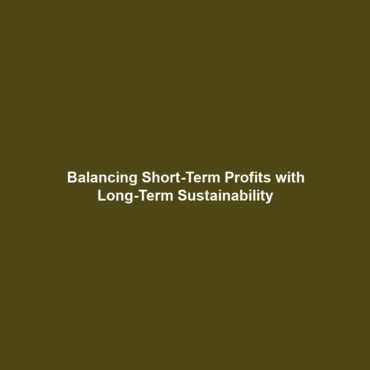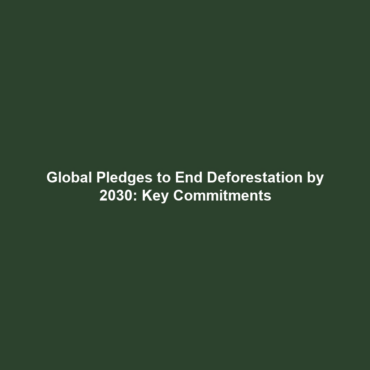The Challenge of Balancing Short-Term Economic Gains with Long-Term Sustainability and Conservation
Introduction
The challenge of balancing short-term economic gains with long-term sustainability and conservation is increasingly significant in the face of ongoing deforestation and biodiversity loss. As developing nations seek rapid economic growth through resource extraction, the repercussions on ecosystems and wildlife habitats become pronounced. This issue highlights the tension between immediate financial benefits and the necessity for ecological preservation, impacting global climate patterns, species extinction rates, and the livelihoods of communities reliant on natural resources. Recognizing the implications of this balance is crucial for fostering both economic and environmental resilience.
Key Concepts
Short-Term Economic Gains
Short-term economic gains refer to immediate benefits achieved through activities such as logging, mining, or agricultural expansion. While these endeavors can boost local economies and provide employment, they often disregard long-term environmental impacts leading to:
- Loss of forest cover
- Habitat destruction
- Shortened resource life cycles
Long-Term Sustainability
Long-term sustainability involves practices that protect natural resources for future generations. This concept includes:
- Conservation efforts
- Restoration of ecosystems
- Adoption of sustainable agricultural practices
Balancing these principles is pivotal within the scope of deforestation and biodiversity loss as it offers pathways for holistic environmental management while still achieving economic goals.
Applications and Real-World Uses
The challenge of balancing short-term economic gains with long-term sustainability and conservation holds critical applications in various sectors:
- Sustainable Agriculture: Implementing practices that ensure crop yields without degrading soil quality.
- Eco-Tourism: Creating economic opportunities that rely on well-conserved natural areas.
- Forest Management: Using selective logging and reforestation to maintain ecosystem integrity.
These applications underscore how addressing this challenge can lead to sustainable pathways for economic development while mitigating issues related to deforestation and biodiversity loss.
Current Challenges
There are several challenges in studying and applying the balance between economic and environmental interests:
- Policy Constraints: Inconsistent regulations across regions often hinder effective conservation efforts.
- Economic Incentives: Short-term financial incentives typically outweigh long-term environmental benefits in economic planning.
- Lack of Awareness: Insufficient understanding among stakeholders about the importance of biodiversity and ecosystem services.
These challenges significantly complicate initiatives aimed at addressing deforestation and biodiversity loss.
Future Research and Innovations
Future innovations in managing the balance between economic and environmental needs include:
- Next-Generation Technologies: Utilizing satellite imaging and AI for monitoring deforestation.
- Sustainable Product Development: Creating biodegradable alternatives to plastic that reduce the need for raw material extraction.
- Collaborative Mechanisms: Strengthening partnerships between governments, NGOs, and businesses for unified conservation strategies.
Continued research in these areas is essential to fostering sustainable practices that can positively influence deforestation and biodiversity loss.
Conclusion
In summary, addressing the challenge of balancing short-term economic gains with long-term sustainability and conservation is vital for tackling deforestation and biodiversity loss. A concerted effort is required to ensure that economic development aligns with environmental stewardship. Stakeholders across different sectors must collaborate to create policies that promote sustainable practices while still fostering economic growth. For more insights on biodiversity preservation, visit our related topics page for additional resources.

